新概念第一册60课课件
合集下载
新概念第一册Lesson59-60(共49张PPT)

beans?/potatoes • We don't have any beans, but we have
some potatoes.
• Do Penny and Sam have any wine?/beer
• They don't have any wine, but they have some beer.
的 writing paper 是不可数的
Learn the text
LADY: I want some envelopes, please. SHOP ASSISTANT: Do you want the large size or the small size? LADY: The large size, please.
He has some large size pads. Lily有一小盒粉笔。
Lily has a small box of chalk.
in the shop
Do you have any…? Do you want any…?
At the stationer’s What do you want?
envelopes, large, small, size, writing paper, we, small pads, one, pad, glue, bottle , glue, large , chalk, small boxes, want one, thank you.
Grammar
一般现在时态 动词:have/ has
3.Do you have your lunch at twelve every day?
造句练习 我有一些零钱。
I have some change. 你有一些信纸。
some potatoes.
• Do Penny and Sam have any wine?/beer
• They don't have any wine, but they have some beer.
的 writing paper 是不可数的
Learn the text
LADY: I want some envelopes, please. SHOP ASSISTANT: Do you want the large size or the small size? LADY: The large size, please.
He has some large size pads. Lily有一小盒粉笔。
Lily has a small box of chalk.
in the shop
Do you have any…? Do you want any…?
At the stationer’s What do you want?
envelopes, large, small, size, writing paper, we, small pads, one, pad, glue, bottle , glue, large , chalk, small boxes, want one, thank you.
Grammar
一般现在时态 动词:have/ has
3.Do you have your lunch at twelve every day?
造句练习 我有一些零钱。
I have some change. 你有一些信纸。
新概念第一册59-60课完整版ppt课件
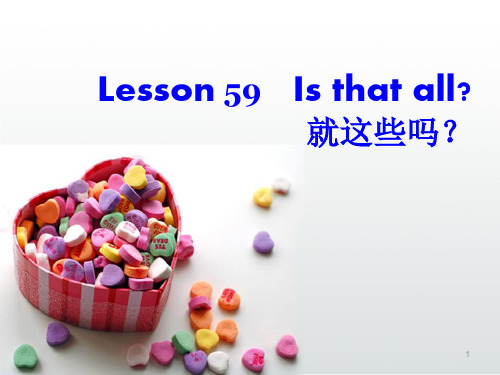
What do you want?
23
Some和any的用法
• Some用在肯定句中, any用在否定句和疑问句
中。
• Some 和any可修饰可数名词的复数和不可数名词 。
• Some 表示一些;any表示任何。
24
Example:
I want some envelopes. I don’t have any small pads.
(1) 当 have 表示“有”这 个概念的时候,其否定形 式和疑问形式各有两种。
第二种
1. I have a sister
可以象普通
2. I don't have a sister. 动词那样,
3. Do you have a sister? 借助一般现
4. He has a sister.
在时助动词
change[tʃeindʒ] n(u). 零钱,找给的 钱 ❖There's your change. ❖keep the change. ❖I have no change. ❖v.变化 ❖I changed a lot. ❖更换 ❖Could I change this blouse for a larger size?
8
❖envelope n.信封 ❖writing paper 信纸 ❖shop assistant 售货员 ❖size n. 尺寸,尺码,大小 ❖pad n. 信笺簿 (可数) ❖glue n. 胶水 (不可数) ❖chalk n. 粉笔 (不可数) ❖change n. 零钱,找给的钱 ❖paper (论文)/ newspaper 中的 paper 是可数
Lesson 59 Is that all?
就这些吗?
23
Some和any的用法
• Some用在肯定句中, any用在否定句和疑问句
中。
• Some 和any可修饰可数名词的复数和不可数名词 。
• Some 表示一些;any表示任何。
24
Example:
I want some envelopes. I don’t have any small pads.
(1) 当 have 表示“有”这 个概念的时候,其否定形 式和疑问形式各有两种。
第二种
1. I have a sister
可以象普通
2. I don't have a sister. 动词那样,
3. Do you have a sister? 借助一般现
4. He has a sister.
在时助动词
change[tʃeindʒ] n(u). 零钱,找给的 钱 ❖There's your change. ❖keep the change. ❖I have no change. ❖v.变化 ❖I changed a lot. ❖更换 ❖Could I change this blouse for a larger size?
8
❖envelope n.信封 ❖writing paper 信纸 ❖shop assistant 售货员 ❖size n. 尺寸,尺码,大小 ❖pad n. 信笺簿 (可数) ❖glue n. 胶水 (不可数) ❖chalk n. 粉笔 (不可数) ❖change n. 零钱,找给的钱 ❖paper (论文)/ newspaper 中的 paper 是可数
Lesson 59 Is that all?
就这些吗?
Lesson60What’sthetime?(课件)新概念英语第一册

轻松学英语 快乐好成绩! Easy English, good happy result!
Goe 2nd picture. What’s the time?
B: It’s five o’clock.
Ask and answer in pairs
A: Look at the 13th picture.
13th
Do you have any bread?
B: Yes, I do. I have some bread.
3. They are swimming in the river.
(变为一般疑问句)
__A_r_e__ they ___sw_i_m_m_i_n_g__ in the river?
4. He usually walks to school.
(变为同义句)
He usually _g_o_e_s__ to school on _f_o_o_t__.
A: Look at the 14th picture.
14th
Do you have any butter?
B: Yes, I do. I have some butter.
15th
A: Look at the 15th picture. Do you have any eggs?
B: Yes, I do. I have some eggs.
hair.
( T ) 4. There are five people in the speaker’s family. ( T ) 5. The speaker’s mother is beautiful. But she is fat.
II. Listen to the passage again and answer the
新概念第一册60课课件

5/30/2014
• C.从 21——99 • 整数几十中除twenty,thirty, forty,fifty,eighty为特 殊形式外,sixty,seventy,ninety都是其个位数形式 后添加后缀-ty构成。表示几十几时,在几十和个位 基数词形式之间添加连字符“-” • 21 twenty-one • 76 seventy-six • D.百位数 • 个数基数词形式加“hundred”,表示几百,在几十几 与百位间加上and. • 101 a hundred and one • 320 three hundred and twenty • 648 six hundred and forty-eight
英语中日期的表达法有两种: 英式英语习惯“先日后月” 。 美式英语习惯“先月后日” 。 如: 10月1日 英式:the first of October 美式:October the first
5/30/2014
• • • • • •
1.2月14日 2.12月31日 3.12月25日 4.6月1日 5.9月10 日 6.8月15日
•11th •12th •13th •14th •15th •16th •17th •18th •19th •20th eleventh twelfth thirteenth fourteenth fifteenth sixteenth seventeenth eighteenth nineteenth twentieth
5/30/2014
• ②集体名词是一些人或物的总称。例如: • people(人们) police(警察) • team(队) group(组) • crew(全体船、机组人员) the Chinese(中国人) • the English(英国人) army(军队) • family(家庭) class(班级) 【注意】集体名词作主语时,其后的谓语动词要用复 数形式,但有的情况需要注意试比较: • Our family are good at swimming. • 我们家人都善长游泳. • Our family is a happy 0ne. • 我们家是一个幸福的家庭。
新概念第一册第59-60课课件
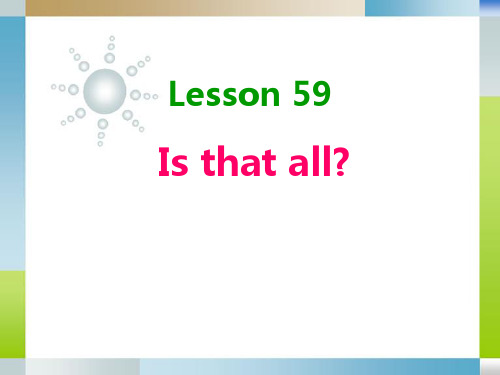
• 婴儿被毛毯包裹着。
7/21/2018
writing paper
/raɪtɪŋ -’peɪpə/ 信纸
shop assistant 售货员
assistant /ə'sɪstənt/ n.
• 1) 店员;售货员 • The assistant took the book and checked the price on the back cover.
1.writing paper, 信纸。 • paper意为“纸”、“纸张”时是不可数名词, • 一张纸应是 a sheet of paper或 a piece of paper。 • 类似的名词还有:
• glue (a bottle of glue一瓶胶水);
• ink (a bottle of ink一瓶墨水)。
• 你的同学是男孩还是女孩?
7/21/2018
②集体名词是一些人或物的总称。例如: people(人们) police(警察) team(队) group(组) crew(全体船、机组人员) the Chinese(中国人) the English(英国人) army(军队) family(家庭) class(班级) 【注意】集体名词作主语时,其后的谓语动词要用 复数形式,但有的情况需要注意试比较: • Our family are good at swimming. • 我们家人都善长游泳. • Our family is a happy 0ne. • 我们家是一个幸福的家庭。
• 店员拿起书,核对了一下封底的定价。
• 2) 助手,助理
• This is your assistant,Tim.
• 这是你的助理,Tim。
7/21/2018
7/21/2018
writing paper
/raɪtɪŋ -’peɪpə/ 信纸
shop assistant 售货员
assistant /ə'sɪstənt/ n.
• 1) 店员;售货员 • The assistant took the book and checked the price on the back cover.
1.writing paper, 信纸。 • paper意为“纸”、“纸张”时是不可数名词, • 一张纸应是 a sheet of paper或 a piece of paper。 • 类似的名词还有:
• glue (a bottle of glue一瓶胶水);
• ink (a bottle of ink一瓶墨水)。
• 你的同学是男孩还是女孩?
7/21/2018
②集体名词是一些人或物的总称。例如: people(人们) police(警察) team(队) group(组) crew(全体船、机组人员) the Chinese(中国人) the English(英国人) army(军队) family(家庭) class(班级) 【注意】集体名词作主语时,其后的谓语动词要用 复数形式,但有的情况需要注意试比较: • Our family are good at swimming. • 我们家人都善长游泳. • Our family is a happy 0ne. • 我们家是一个幸福的家庭。
• 店员拿起书,核对了一下封底的定价。
• 2) 助手,助理
• This is your assistant,Tim.
• 这是你的助理,Tim。
7/21/2018
新概念英语第一册57-60课课件(一般现在时vs现在进行时)
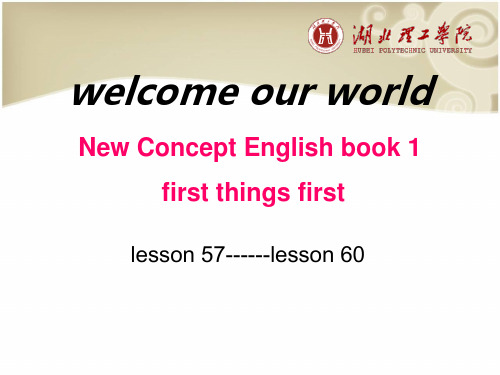
At the stationer’s
12/17/2015
Lesson 59 Listen and answer these questions:
Q1:Does the lady want the large size of envelopes?
Q2:What size of pads of writing paper does the shop
Ⅳ. grammars
• 1. 一般现在时vs现在进行时 • 2. have 的用法 • 3.复习名词复数
1.Grammar in use
—一般现在时 —现在进行时
一般现在时
主语
第三人称复数
谓语
动词原形:do
The Sawyers live at 87 King Street. The children go to school. They often drink tea together. The children come home from school. They arrive home early. The children always do their homework. He and his wife watch television.
现在进行时 1. Look! They are running . 2. Listen! Someone is singing in the next room. 3. The Greens are watching a football match now.
现在进行时:表示现在、说话瞬间正在进行或发生
Ⅳ. grammars
动词第三人称单数的变化规则 1. 一般情况下,直接在动词词尾+s ,例如:get→gets;
Lesson60(课件)新概念英语第一册

Grammar
Do you have any cheese? I don’t have any cheese, but I have some butter.
I have some peaches.
I don't have any peaches.
Do you have any peaches? Yes, I do. No, I don't.
Lesson 60 What's the time?
What time is it?
What’s the time?
It’s
o’clock.
What’s the time?
It’s
.
It’s
.
What’s the time?
It’s
.
It’s
.
What’s the time?
It’s
.
What’s the time?
-- ________ you have any honey? -- Yes, I ________(do).
It’s three five. = It’s five past three. It’s three twenty. = It’s twenty past three.
SUMMARY
It’s
.
It’s
.
What’s the time?
It’s
.
It’s
.
Do you have
?
I don’t have
,
but I have
.
Do you have I don’t have but I have
? , .
Do you have _________? I _____have any cheese, but I ______ some you _____ ______ _____? I ____ _____ ____ cheese, but I_____ _____ butter.
新概念第一册60课
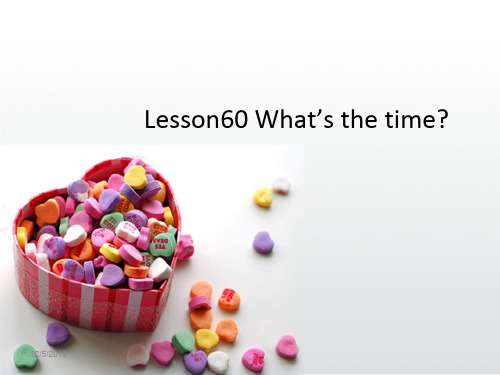
之间需用逗号隔开) • 读作:January the seventeenth, two thousand and two • 2) 日\月\年 • 例:2002年1月17日 • 写作:17(th) January, 2002或the seventeenth of January, 2002
(月和年之间需用逗号隔开) • 读作:the seventeenth of January, two thousand and two
( It’s a quarter past six. )
现在是六点十五分。 (现在是六点过一刻。)
6. It’s three fifty.
( It’s ten to four. )
现在是 三点五十分。 ( 现在是差十分四点。)
12/5/2019
数词
• 数词可分为两类:基数词和序数词。 • 基数词:表示 数目 的词 (one, two ) • 序数词:表示 顺序 的词 (first, second)
•11th eleventh •12th twelfth •13th thirteenth •14th fourteenth •15th fifteenth •16th sixteenth •17th seventeenth •18th eighteenth •19th nineteenth •20th twentieth
12/5/2019
Cardinal number(序数词)
• 1st first • 2nd second • 3rd third • 4th fourth • 5th fifth • 6th sixth • 7th seventh • 8th eighth • 9th ninth • 10th tenth
(月和年之间需用逗号隔开) • 读作:the seventeenth of January, two thousand and two
( It’s a quarter past six. )
现在是六点十五分。 (现在是六点过一刻。)
6. It’s three fifty.
( It’s ten to four. )
现在是 三点五十分。 ( 现在是差十分四点。)
12/5/2019
数词
• 数词可分为两类:基数词和序数词。 • 基数词:表示 数目 的词 (one, two ) • 序数词:表示 顺序 的词 (first, second)
•11th eleventh •12th twelfth •13th thirteenth •14th fourteenth •15th fifteenth •16th sixteenth •17th seventeenth •18th eighteenth •19th nineteenth •20th twentieth
12/5/2019
Cardinal number(序数词)
• 1st first • 2nd second • 3rd third • 4th fourth • 5th fifth • 6th sixth • 7th seventh • 8th eighth • 9th ninth • 10th tenth
Lesson59-60(课件)新概念英语第一册
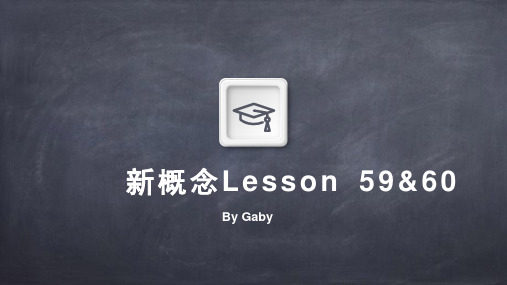
三. 单项选择 ( B ) 1.一 Do you have_____ wine? No, but I have_____ beer. A. any, any B. any, some C.some, some D.some, any ( A ) 2. What_____ you want? A. else do B. do else C.some, one D.some, ones ( D ) 3. We have some cheese, but she _____. A.do B.don't C. does D. doesn’t ( D ) 4. I want a _____. A. chalk B. glue C. paper D. box of chalk
Lesson 60
What’s the time? = What time is it? 几点了? It’s .... (eight/nine)o’clock. (整点) 豌豆 honey
Lesson 60
Do you have any ...? 你有......吗? ① any + 可数名词复数:friends/ envelopes/ bananas...? ② any + 不可数名词:coffee/ tea/ time...? ③ 不加: 可数名词单数
二. 用括号中所给词的正确形式填空。 1. Are there any peaches ? (peach) 2. I don't have any glue . (glue) 3. Does he want any potatoes? (potato) 4. She doesn't have any knives. (knife) 5. Give me three boxes of chalk please. (chalk) 6. Is there any wine in the bottle? (wine) 7. I don't have any beef, but I have some lamb.(lamb) 8. Does she like cabbages ? (cabbage)
新概念英语第一册第60课课件 (上课用)

• 1. 1996 • 2. 1997 • 3. 1945 • 4. 2001 • 5. 2008 • 6. 2010
年的读法
nineteen ninety- six nineteen ninety- seven nineteen forty- five two thousand and one two thousand and eight two thousand and ten
可数名词复数变化规则
记Байду номын сангаас
4.辅音字母+y结尾的普通名词 去y改i + es
baby → babies story→ stories
5.元音字母+y结尾的名词
+y
boy→ boys
笔
toy→ toys
6.以f或fe结尾
7.不规则变化
8. 单复数同形
1.某些动物、鸟类、鱼类的名称; 2.某些交通工具; 3.某些表示国籍的名词。
At the stationer’s
I want…
What do you want ?
Do you have any ...?
No,I don’t have any ..., but I have some ....
Make a shopping list with your partner.
可数名词复数变化规则
1.大多数情况下
+s
pad → pads
lettuce → lettuces
记
2.以s,x,ch,sh,o结尾
+es
蛇口诀:蛇吃XO 就会死
3. o结尾
+s
1.一些以O结尾的缩写词或截短词; 2.一些以0结尾意大利音乐外来术语; 3. 一些以O结尾的专有名词。 4.以元音字母+O 结尾
Lesson5960(课件)新概念英语第一册
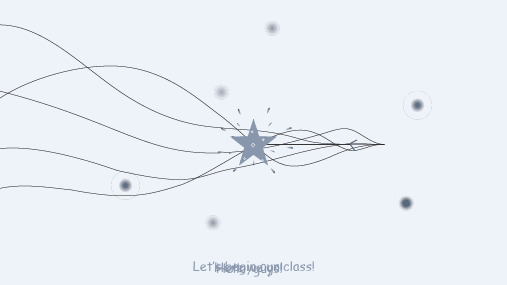
Do you want one? Lady: No, thank you. Stationer: Is that all? Lady: That's all, thank you. Stationer: What else do you want? Lady: I want my change.
• Words
envelope n.信封 [‘envələʊp]
writing paper信纸 shop assistant
售货员 chalk [tʃɔ:k]
n.粉笔
size [saɪz] n.尺寸,尺码,大小
pad [pæd] n.信笺簿
glue [glu:] n.胶水
change [tʃeɪndʒ] n.零钱,找给的钱; v.兑换(钱)
I only have large__on_e_s_. Do you want a pad ? Lady: Yes, please.
Fill in the blanks
Lady: And I want some__gl_u_e_. Stationer: A _b_o_t_t_le_of glue. Lady: And I want a large box of__c_h_al_k_, too. Stationer: I only have small boxes.
Lady: And I want some glue. Stationer: A bottle of glue. Lady: And I want a large box of chalk, too. Stationer: I only have small boxes.
Do you want one? Lady: No, thank you. Stationer: Is that all? Lady: That's all, thank you. Stationer: What else do you want? Lady: I want my change.
• Words
envelope n.信封 [‘envələʊp]
writing paper信纸 shop assistant
售货员 chalk [tʃɔ:k]
n.粉笔
size [saɪz] n.尺寸,尺码,大小
pad [pæd] n.信笺簿
glue [glu:] n.胶水
change [tʃeɪndʒ] n.零钱,找给的钱; v.兑换(钱)
I only have large__on_e_s_. Do you want a pad ? Lady: Yes, please.
Fill in the blanks
Lady: And I want some__gl_u_e_. Stationer: A _b_o_t_t_le_of glue. Lady: And I want a large box of__c_h_al_k_, too. Stationer: I only have small boxes.
Lady: And I want some glue. Stationer: A bottle of glue. Lady: And I want a large box of chalk, too. Stationer: I only have small boxes.
Do you want one? Lady: No, thank you. Stationer: Is that all? Lady: That's all, thank you. Stationer: What else do you want? Lady: I want my change.
Lesson60 What's the time_(课件)新概念英语第一册

He doesn't have any apples. Does he have any apples? Yes,he does. No,he doesn't.
句型转换
1.I have some bananas. ( 否定句 )
I d__on_’_t _h_a_v_e __a_n_ybananas.
but
I don’t have any bananas , but I have some grapes.
but
Uncountable nouns Countable nouns
(不可数名词)
(可数名词)
cheese butter
jam
honey
bread steak
mince chicken
2.I have some beer. ( 一般疑问句)
__D_o_ you have_a_n_y_beer?
3. He has some lettuces. (否定句 )
Hed_o_e_sn_’thave _a_n_y_tea.
4. My mother has some grapes. (划线提问)
have v.有
1. I have some cheese.
cabbages
I don’t have any cheese.
Do you have any cheese?
Yes, I do. No, I don’t.
What do you have?
2. Nina has some butter. Nina doesn’t have any butter. Does Nina have any butter? Yes, she does. No, she doesn’t. What does Nina have?
句型转换
1.I have some bananas. ( 否定句 )
I d__on_’_t _h_a_v_e __a_n_ybananas.
but
I don’t have any bananas , but I have some grapes.
but
Uncountable nouns Countable nouns
(不可数名词)
(可数名词)
cheese butter
jam
honey
bread steak
mince chicken
2.I have some beer. ( 一般疑问句)
__D_o_ you have_a_n_y_beer?
3. He has some lettuces. (否定句 )
Hed_o_e_sn_’thave _a_n_y_tea.
4. My mother has some grapes. (划线提问)
have v.有
1. I have some cheese.
cabbages
I don’t have any cheese.
Do you have any cheese?
Yes, I do. No, I don’t.
What do you have?
2. Nina has some butter. Nina doesn’t have any butter. Does Nina have any butter? Yes, she does. No, she doesn’t. What does Nina have?
- 1、下载文档前请自行甄别文档内容的完整性,平台不提供额外的编辑、内容补充、找答案等附加服务。
- 2、"仅部分预览"的文档,不可在线预览部分如存在完整性等问题,可反馈申请退款(可完整预览的文档不适用该条件!)。
- 3、如文档侵犯您的权益,请联系客服反馈,我们会尽快为您处理(人工客服工作时间:9:00-18:30)。
February the fourteenth December the thirty-first December the twenty-fifth June the first September the tenth August the fifteenth
5/30/2014
年的读法:
• • • • • • 1. 1996 2. 1997 3. 1945 4. 2001 5. 2008 6. 2010 nineteen ninety- six nineteen ninety- seven nineteen forty- five two thousand and one two thousand and eight two thousand and ten
5/30/2014
如果所表述的分钟和15有关,就有三种表达 法
• 15分钟又叫一刻钟:a quarter • 9:15 - nine fifteen ; • fifteen past nine ; • a quarter past nine 3:45 - three forty-five ; • fifteen to four ; • a quarter to four
5/30/2014
大约时间
• It’s almost two. 马上到两点了。 • It’s not quite two. 还不到两点。 • It’s just after two. 刚过两点 。
5/30/2014
D. 年月日
• • • •
• • • • •
用英语表达年月日的顺序: 1) 月\日\年 例:2002年1月17日 写作:January 17(th), 2002或January seventeenth, 2002(日和年 之间需用逗号隔开) 读作:January the seventeenth, two thousand and two 2) 日\月\年 例:2002年1月17日 写作:17(th) January, 2002或the seventeenth of January, 2002 (月和年之间需用逗号隔开) 读作:the seventeenth of January, two thousand and two
5/30/2014
Ask about date and time
• -What's the date today? (date) • -It's Dec. 1st , 2009. • -What day is today? (day) • -Today is Tuesday. • -What's the time now? (time) • -It's 8 o'clock.
5/30/2014
• (2)不可数名词分物质名词和抽象名 词两种
• ①物质名词指物质或一般无一定形状或 大小的实物。例如: • water(水) milk(奶), • bread(面包) mest(肉)等. 【注意】物质名词作主语时,其后面的谓 语动词用单数形式。 例如: There is some milk in the glass. 杯里有些牛奶。
How to write a letter
• • • • • • • 顶格写称呼,一般以Dear XXX开头, 次行,隔3-5个字母 正文 祝福语 Best wishes! 落款 Yours, Sincerely yours, xxx
5/30/2014
语法精析
• 普通名词包括可数名词和不可数名词两种。 • (1)可数名词有个体名词(类名词)和集体名词(集 合名词)两种。 • ①个体类名词是指一类人或物的总称。例如: • boy(男孩),girl(女孩),boat(船),pen(钢 笔).bed(床).orange(橘子)等. • Is your classmate a boy or a girl? • 你的同学是男孩还是女孩? • Do you prefer an apple or a pear? • 你喜欢苹果还是喜欢梨?
5/30/2014
数词
• 数词可分为两类:基数词和序数词。 • 基数词:表示 数目 的词 (one, two ) • 序数词:表示 顺序 的词 (first, second)
5/30/2• • • • • • • 1st first 2nd second 3rd third 4th fourth 5th fifth 6th sixth 7th seventh 8th eighth 9th ninth 10th tenth
• 10:35 twenty-five to eleven、 • 5:50 ten to six、 • 9:49 eleven to ten
5/30/2014
如果所表述的时间恰好为半小时,可以用 “half + past + 小时”
• 11:30 half past eleven、 • 2:30 half past two
5/30/2014
• b. 有些抽象名同可以转化为类名词.例如,bus公共 汽车;by bus乘公共汽车。是一种交通手段.bus起抽 象名词的作用,而bus本身是类名词 • c. 物质名词和抽象名词都是不可分的,也无法用数 目来计算都是不可数名词.其前面不能用不定冠词 a或an来表示量,其后不能变复数形式。 【注意】有些普通名词具有双重性,既可作可数名 伺,又可作不可数名词,但词义上有区别。 • 例如: • glass玻璃(不可数) a glass玻璃杯(可数) • iron铁(不可数) an iron熨斗(可数)
5/30/2014
What time is it?
5/30/2014
Answers
1. It’s nine forty-five. ( It’s a quarter to ten.) 现在是九点四十五分。 (现在是差一刻十点。) 2. It’s two seventeen. ( It’s seventeen past two.) 现在是两点十七分。 (现在是两点过了十七分。) 3. It’s three o’clock. ( It’s three o’clock. ) 现在是三点。 4. It’s nine thirty. ( It’s half past nine. ) 现在是九点半。 (现在是九点半。) 5. It’s six fifteen. ( It’s a quarter past six. ) 现在是六点十五分。 (现在是六点过一刻。) 6. It’s three fifty. ( It’s ten to four. ) 现在是 三点五十分。 ( 现在是差十分四点。)
Lesson60 What’s the time?
5/30/2014
所有的时间都可用“小时 + 分钟”直接读
• 6:10 six ten • 8:30 eight thirty • 2:40 two forty
5/30/2014
整点
• 现在是两点整。 It’s two. • It’s two o’clock. • It’s two o’clock sharp. • It’s two o’clock on the dot. • It’s two o’clock on the nose. • It’s exactly two o’clock .
5/30/2014
序数词在时间中的表达使用:
• • • • • • 1.表示月日时,“年”用基数词, “日”用序数词, 如: 1949年10月1日 写法:Oct.1,1949 读法:October the first, nineteen forty-nine
5/30/2014
• • • • • • •
英语中日期的表达法有两种: 英式英语习惯“先日后月” 。 美式英语习惯“先月后日” 。 如: 10月1日 英式:the first of October 美式:October the first
5/30/2014
• • • • • •
1.2月14日 2.12月31日 3.12月25日 4.6月1日 5.9月10 日 6.8月15日
5/30/2014
Excises 写出下列时间
• • • • • • 1. It‘s nine forty-five. 2. It‘s two seventeen. 3. It‘s three. 4. It‘s nine thirty. 5. It's six fifteen. 6. It's three fifty.
5/30/2014
• • • • • •
基数词 表示数目的词称为基数词。其形式如下: A.从1——10 one,two,three,four,five,six,seven,eight,nine,ten. B.从 11——19 eleven,twelve, thirteen, fourteen, fifteen, sixteen, seventeen,eighteen, nineteen. • 这里除 eleven, twelve, thirteen, fifteen, eighteen为特殊形式 外,fourteen,sixteen,seventeen,nineteen都是由其个位数形 式后添加后缀-teen构成。
5/30/2014
Today is Apr.29th, 2013
• I want to write a letter to one of my friend, • I have a pen, what else do I need?
5/30/2014
glue envelope stamp
writing paper
•11th •12th •13th •14th •15th •16th •17th •18th •19th •20th eleventh twelfth thirteenth fourteenth fifteenth sixteenth seventeenth eighteenth nineteenth twentieth
